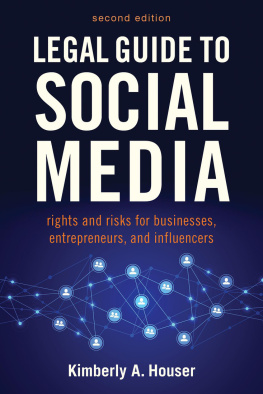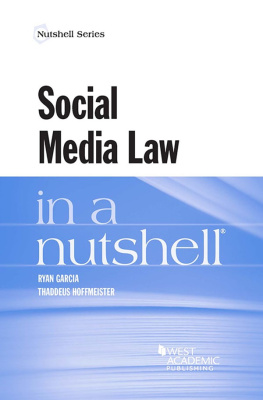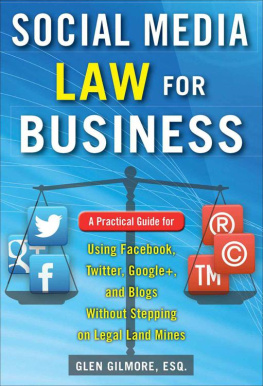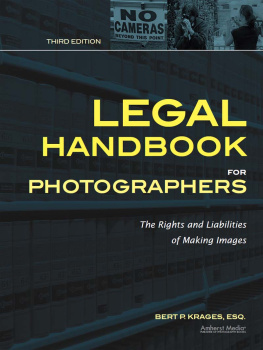Kimberly A. Houser

ALLWORTH PRESS
NEW YORK
Copyright 2013 by Kimberly A. Houser
All Rights Reserved. Copyright under Berne Copyright Convention, Universal Copyright Convention, and Pan American Copyright Convention. No part of this book may be reproduced, stored in a retrieval system, or transmitted in any form, or by any means, electronic, mechanical, photocopying, recording or otherwise, without the express written consent of the publisher, except in the case of brief excerpts in critical reviews or articles. All inquiries should be addressed to Allworth Press, 307 West 36th Street, 11th Floor, New York, NY 10018.
Allworth Press books may be purchased in bulk at special discounts for sales promotion, corporate gifts, fund-raising, or educational purposes. Special editions can also be created to specifications. For details, contact the Special Sales Department, Allworth Press, 307 West 36th Street, 11th Floor, New York, NY 10018 or .
17 16 15 14 13 5 4 3 2 1
eISBN: 978-1-62153-388-7
Published by Allworth Press, an imprint of Skyhorse Publishing, Inc.
307 West 36th Street, 11th Floor, New York, NY 10018.
Allworth Press is a registered trademark of Skyhorse Publishing, Inc., a Delaware corporation.
www.allworth.com
Cover and interior design by Mary Belibasakis
Page composition/typography by Integra Software Services, Pvt., Ltd., Pondicherry, India
Library of Congress Cataloging-in-Publication Data is available on file
ISBN: 978-1-62153-267-5
Printed in the United States of America
For my daughter, Anastasia Nicole
ACKNOWLEDGEMENTS
I would like to thank everyone at Allworth Press for being so organized and walking me through the entire process, especially Tad Crawford, Delia Casa, and Thornwell May.
I send a heartfelt thanks to the businesswomen who helped me come up with topics for this legal guide: Sandra Esse DiBona, Anney Smith, Vicky Rudy, and Amy Schubert. I also want to express appreciation to my boss, Chris Harman, for his enthusiasm about this book and to my high school drama teacher, Joe Gerace, who encouraged me to write this book while he was writing his.
I am also grateful to my two best friends Ken Jones and Laurie Swanson Oberhelman whom I have known since high school. Both had unflappable faith that this book would be published and both cheered me on every step of the way. Ken never let me doubt myself and Laurie held me accountable on a daily basis during the last month of the projectno small feat.
I would also like to thank my friends, my current and former students, and all of my clients for trusting me with their questions and encouraging me in my writing.
INTRODUCTION
If You Are in Social Media Marketing and Have Posted Content Online or Set Up a Website Without Consulting an Attorney, Help Is on the Way!
F acebook, Twitter, YouTubewe all use them. We all view them. But do we really know whether what we post is legal? Do we really think through each word we type prior to hitting send? Do people really take those Facebook posts seriously? Donald Trump did. In December 2012, an arbitrator ordered Sheena Monnin, a contestant in the Miss USA pageant, to pay the Miss Universe Organization (owned by Donald Trump) $5 million for defamatory statements she posted on Facebook.
In the past few years we have seen a dramatic increase in lawsuits being filed and fines assessed against people posting comments and videos on the Internet. This increase in lawsuits and fines corresponds with the recent explosion of the use of social media. In 2012, Facebook reported over 1 billion active users up from 150 million users in 2009.
Social media marketing is the use of interactive websites to promote services and products. Unlike traditional one-way advertisements, social media sites permit consumers the ability to converse directly with the advertisers as well as endorse or denounce products and services on their own. HubSpot reported that in 2010 advertisers spent almost $1.7 billion on social media marketing.
Social media marketing includes a wide variety of activities; however, it has a singular purpose: to generate business through Internet sites. According to Mashable, social media marketing programs usually center on efforts to create content that attracts attention and encourages readers to share it with their social networks. A corporate message spreads from user to user and presumably resonates because it appears to come from a trusted, third-party source, as opposed to the brand or company itself. Hence, this form of marketing is driven by word-of-mouth, meaning it results in earned media rather than paid media. This includes setting up websites; setting up social media profiles; creating content; monitoring social media; linking to other websites; blogging; posting comments on websites, blogs, and social media sites; posting videos and podcasts on websites, blogs, or social media sites; and much more.
The legal issues are varied and the implications enormous, both for the companies and advertisers trying to control conversations about their products and services, and for the consumer who takes it upon himself or herself to generate content about a product or service. Social media marketing differs from traditional marketing in that the marketing efforts are no longer outbound. They include inbound messaging and viral messaging. The message can take on a life of its own, sometimes leading to a telephone game result. Companies and advertisers attempting to influence consumers through the Internet have to deal with a host of unpredictable results. If there is one thing the law likes, it is predictability. The advantage of the social media marketers is their narrow focus and ability to monitor messages and consumers in a way that most large businesses cannot. The disadvantage is that laws regarding traditional forms of advertising are being applied to new technologies in ways that cannot be anticipated.
Despite the easy entry into this field, many users of social media are not aware of the enormous legal risks involved in their online activities. These risks include violating state and federal advertising laws, copyright laws, privacy laws, securities laws, trademark laws, and tort laws such as defamation. Many people engaged in social media marketing are regularly posting on websites belonging to others without understanding how such a websites terms of use could affect them. In addition to liability for their own posts, there is also the potential to become liable for third-party content posted to their own sites. The jurisdictional issues alone are mind-boggling. A Louisiana resident posting comments on a website about a Florida resident could inadvertently expose herself to a lawsuit in Florida based on that states defamation laws.
How can social media marketers avoid being sued or fined for posts they didnt even know were violations of the law? The easy answer is by becoming informed. Unfortunately, there are not many places to look for this type of information. There is a great deal of false information posted on the Internet by non-attorneys regarding the legalities of social media marketing efforts. The legal websites and blogs out there simply describe recent lawsuits, which may be frightening but are not particularly helpful. The government websites only talk about the laws in their jurisdiction. None give practical advice on avoiding violations, and many contain inaccurate or outdated information. The most common types of risks, however, can be avoided by taking simple steps before, during, and after engaging in online activities.












